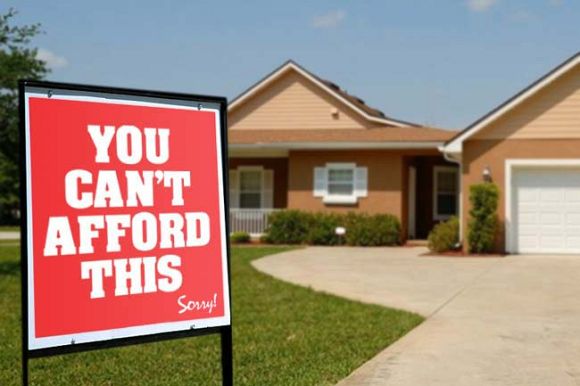Owners corporations have recently come under attack for their dodgy practices and an overhaul of strata committees of management is also long overdue, writes Char Weeks.
THERE ARE ROUGHLY 3 million strata townhouses and apartments in Australia. The focus on highrise developments to address the housing crisis has seen a 7 per cent increase in the number of strata properties over the last two years. In Victoria, the government redevelopment plan for inner Melbourne proposes that 84 per cent of new dwellings will be highrises of ten storeys or more.
Owners corporations manage and administer communal property for apartments and other dwellings.
Recently certain high-profile owners corporations have come under media scrutiny. Dubious and unethical business practices have been exposed. These include kickbacks to contractors, phantom charges, inflated fees relative to the extent of work done and near-invisible accountability. Over 2,000 people from across Australia responded to an ABC investigation into the strata industry.
Not all owners corporations can be tarred with the one brush. There are many where their good reputation and profitability reflect an unswerving commitment to their clients.
As housing density increases across Australia, so will the number of properties that operate under owners corporations and strata committees of management. At the bare minimum, strata owners should expect that both the owners corporation and the strata committee will act ethically in the best interests of all owners.
It’s easy to point the finger at owners corporations. When decision-making appears opaque, maintenance requests are ignored, emails are left unanswered and the rules are unevenly applied, strata committees must also be held accountable.
Large strata committees are not equipped to deal with torrents of work
Strata committees comprise elected owners who receive no payment. These volunteers are strata owners who are passionate about the community and its upkeep. Some have full-time jobs and care for a family. Yet, they find time to wade through the 150 emails received each week that generate voluminous work for the committee.
One semi-retired strata committee chair said that they work three days just on committee matters. The sheer volume of work sits in the hands of a dedicated few.
Strata committee volunteers tolerate intrusions into their personal time. Aggrieved owners arrive on their doorstep unannounced to demand, complain or criticise. Only the most impervious of strata owners nominate to serve their community year in and year out.
The work that flows to a strata committee is often complex and relentless, magnified by time pressures to get things done. The volume of work is compounded when there exist limited or poorly documented policies, processes and procedures. These are necessary to guide continuity, consistency of decision-making and the even application of rules.
Incomplete information leads to flaws in decision-making, punctures in process, undocumented approvals for expenditure, and favouritism, which are often outcomes that reflect the administrative strain on overloaded strata committees. The strata community is often quick to expose perceived weaknesses but slower to offer support.
Staff changes in owners corporations contribute to the communications melee, especially when the recording of historical documentation has been ad hoc and resolutions can’t be found or don’t exist.
Deficiencies in communication rarely sit well with strata owners when kept waiting for a response. Where gossip is the currency that drives community cohesion, it is easy to breed discontent. Then the strata committee’s activities become the target. Frustration can translate into heckling at public and annual general meetings as angry owners zealously ventilate their discontent while shouting for answers.
Case study: the unsolved mystery of the hole drilled in a strata owner's private veranda.
Owners of a strata title apartment in Melbourne’s east became unwilling victims of abject failures of communication and process when workers on an adjoining property unwittingly drilled their private veranda.
Six months prior, the owners became aware of proposed works planned for this adjoining property. They contacted the owners corporation to enquire about the impact of these works on their private veranda but received no response.
The owners were formally notified of the repair work several days before it commenced. They were assured that there would be no impact of the works on their property. After the work began, a hole was drilled in their private veranda without their knowledge or consent.
Understandably, the owners were upset. They contacted the owners corporation to ask who approved the work and its scope. There was no immediate response. Then, they scoured minutes of previous meetings of the strata committee meetings for evidence of a resolution. They drew a blank.
The owners continued to pursue an explanation for the incursion onto their property. According to an owners corporation manager, there was not much information about the decision to do the work on the adjoining veranda.
The owners lodged a formal complaint. This was heard by the strata committee’s grievance committee, consisting of three volunteer members of the strata committee. The matter remains unresolved.
To the strata owners affected by the repair next door, the hole is more than just a hole. It’s a violation of their private property. Workers trespassed on their property. The hole highlights a deficiency in oversight and procedural neglect. The workers should have checked both property boundaries before they started to drill. Worse, this entire saga has pitted neighbour against neighbour, damaging what was once a good relationship.
These owners’ experience highlights the urgent need for owners corporations and strata committees to be forced to “play by the book”. Strata owners are no longer willing to entrust the management of their assets to companies and committees that use smoke and mirrors to disguise structural, financial, ethical and communication deficits.
Strata owners need more control over who is spending their money and how it's spent
The time for change is now.
As high rises proliferate across Australian horizons, more strata communities will have operating budgets that sit around $1 million per year. Their annual turnover approximates that of a small business. For-profit owners corporations should be subject to the same rigorous regulation as applied to companies by the Australian Securities and Investments Commission (ASIC).
Strata committees must also be held accountable for the integrity of their conduct and operations. In the interests of good governance, trust, transparency, reliability and accountability are paramount. Regulation may be a lever to encourage strata committees to operate more professionally. The challenge is to ensure that any regulation is applied consistently and considers the diversity of strata communities.
Strata owners should expect that the strata committee's strategic objectives or work plans reflect the expressed needs of the entire community and not the wants of a chosen few. How many committees of management deliver services that reflect the demographic profile of their community? Do strata committees encourage members from the spectrum of strata owners?
Strata community expectations of their elected committee members are sometimes overly inflated when it comes to judging their performance. The vast and elusive blend of knowledge, skills, experience and behaviours required to be a committee member more reflects the topic of a Doctor of Philosophy than the supposedly casual contribution of a volunteer who has their heart in the right place for their community.
If close scrutiny is good enough for Coles and Woolworths, it is good enough for owners corporations and strata committees.
The time is now to undertake a comprehensive review of the state legislation that oversees the operations of owners corporations. It must expose the antics of unscrupulous owners corporations and regulate for an evolving future. The strata committee, entrusted by strata communities, must be able to withstand the closest of scrutiny.
Strata owners are no longer willing to be victims of power games. Penalties should be considered for rogue committee members if found to breach their fiduciary duty.
Across Australia, strata owners are frustrated and angry at owners corporation’s shonky behaviour. Federal legislation of owners corporations, perhaps under the Corporations Act 2001, with state-regulated strata committees of management with an annual turnover of $1 million or more may help to address these issues.
Standards for ethical conduct, good business practice and accountability must be raised, monitored, audited and enforced. The legislation must not disadvantage smaller strata developments. However, it must be fit for the purpose of accommodating larger strata communities as they come online. It must position strata owners and strata communities at the centre of the legislation.
Harmony and community connection are the deserved outcomes of good governance and a transparent relationship between owners corporations and strata committees.
Char Weeks is the founder of the award-winning secure digital information safe, Secure My Treasures. Intolerant of injustices, she now campaigns against job ageism, elder abuse and domestic violence.
 This work is licensed under a Creative Commons Attribution-NonCommercial-NoDerivs 3.0 Australia License
This work is licensed under a Creative Commons Attribution-NonCommercial-NoDerivs 3.0 Australia License
Support independent journalism Subscribe to IA.

Related Articles
- The Dom Pérignon buyers' scheme
- 'Insiders' ignores hard facts of housing crisis
- Housing crisis worsened by media fearmongering
- Dirty little housing crisis secrets hidden by the mainstream media
- Bank of Mum and Dad making it harder for those less fortunate












